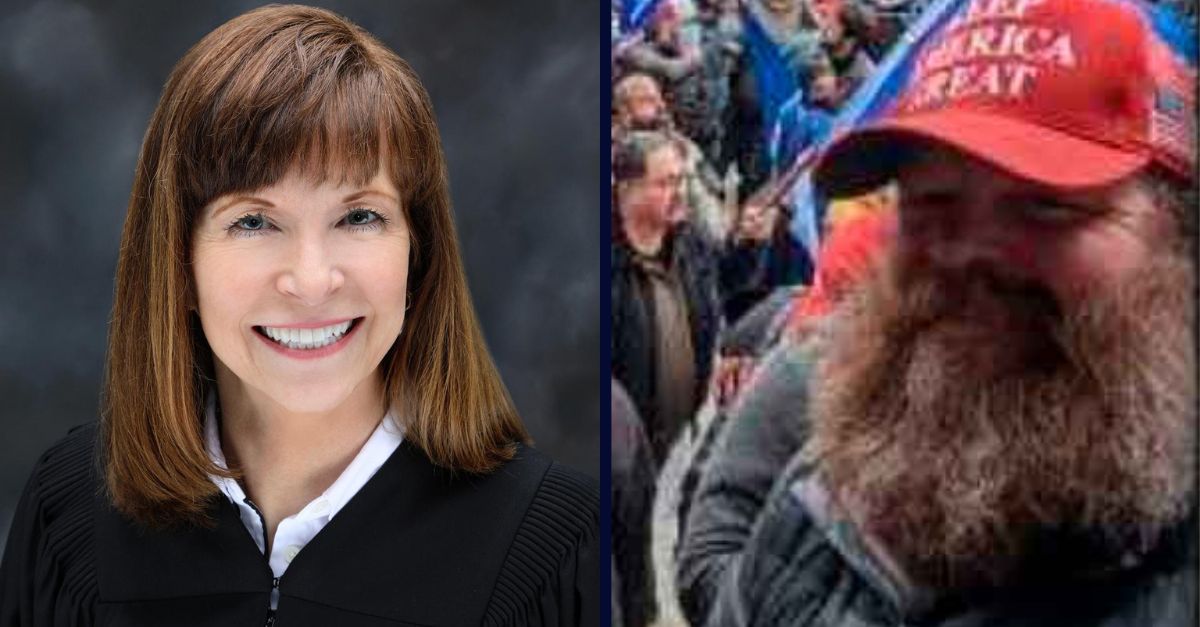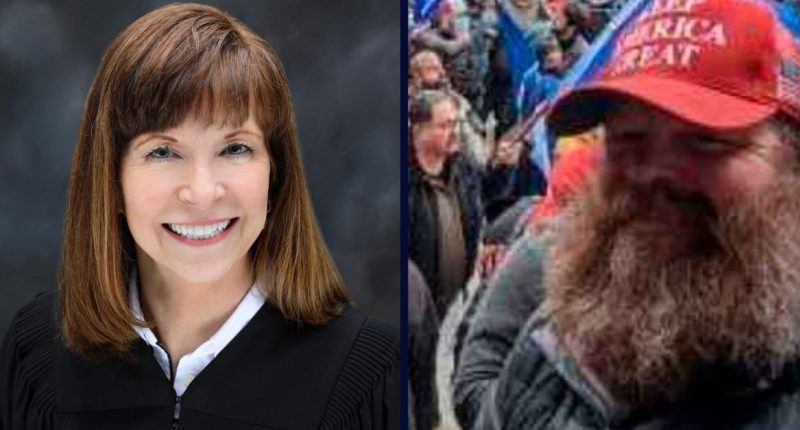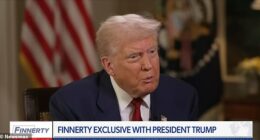
Left: U.S. District Judge Jennifer L. Thurston (Eastern District of California). Right: Benjamin Martin (DOJ).
A federal judge in California has withdrawn from the case of a pardoned Jan. 6 rioter after the Trump administration notified the court that it supported the defendant’s motion to be released from prison as he appeals separate felony gun charges on the theory that his pardon absolved him of those crimes as well.
While it was not immediately clear if the judge resigned in protest, it would be the result of the Justice Department’s new position that President Donald Trump’s sweeping grant of pardons for those convicted of attacking the Capitol extends to a variety of crimes unrelated to Jan. 6.
“Good cause appearing, the assigned District Judge disqualifies herself from all proceedings in the present action,” U.S. District Judge Jennifer L. Thurston wrote in a self-signed order filed Wednesday. “The Clerk of the Court SHALL reassign this action to the docket.”
Chief U.S. District Judge Troy L. Nunley stepped in later that day and signed the document granting the release of 46-year-old Benjamin Martin.
Martin, who has multiple previous convictions for domestic violence, was found guilty in November 2024 of possessing an illegal weapons cache that included an AR‑style rifle and 500 rounds of ammunition. His conviction came after a one-day trial before Thurston, who subsequently ordered Martin to serve three years and two months in federal prison.
Martin in June 2024 was convicted for his role in the Capitol riot, where he confronted cops at a set of doors to the U.S. Capitol building and got sprayed by mace.
The weapons case came to light in September 2021 when the FBI executed a search warrant at his residence in Madera in connection with the Jan. 6 breach.
During the search, agents seized eight firearms, including an AR‑15‑style rifle, multiple high-capacity magazines for the AR-15, and more than 500 rounds of ammunition, which he had been prohibited from possessing because of a prior domestic violence conviction, authorities said. He had choked his then-girlfriend and dragged her back into the house after she tried to flee, officials said.
Shortly after his arrest, Martin was caught on a recorded jail call where he instructed his current fiancee to lie to authorities and tell them that the firearms seized from his residence belonged to her and her father and that he did not know about them. Martin received an enhancement to his sentence for witness tampering, officials said.
After Trump issued about 1,500 blanket pardons for the rioters, Martin argued on appeal that the president meant to absolve him of the gun charges as well. He reasoned that because the search warrant stemmed from his actions during the Capitol attack, any evidence obtained through that search was sufficiently “related to” the events of Jan. 6.
At first, the DOJ vehemently rejected the notion that Martin’s California weapons cache was covered by the president’s pardon.
“Martin’s pardon for January 6, 2021 offenses he committed in Washington, D.C., does not reach his separate firearms offense he committed in California at a different time. The plain language of the pardon says it ‘applies only to convictions for offenses related to events that occurred at or near the United States Capitol on January 6, 2021,”” the DOJ wrote in court filings on Feb. 14, opposing Martin’s release pending appeal. “Martin’s instant conviction is not punishment for his conduct on January 6, 2021, nor was the search of his residence a consequence of his conviction. Martin’s argument conflates the investigation that discovered his instant offense conduct with the offense itself, contrary to the plain language of the pardon.”
But in the days that followed, federal prosecutors reversed course and began arguing that Trump’s pardons covered related weapons offenses.
For example, prosecutors last week asked a federal judge to drop weapons charges against convicted Capitol rioter Daniel Wilson. After initially claiming Wilson was erroneously released from prison after receiving his pardon, the DOJ last week said new directives indicated that Trump meant for Wilson to be set free.
“In the intervening period since the government filed its response, the government has received further clarity on the intent of the pardon,” prosecutors wrote last week. “Under these circumstances, the Presidential Pardon includes a pardon for the firearm convictions to which the defendant pled, similar to other defendants in which the government has made comparable motions.”
Less than two weeks after opposing Martin’s assertion that his weapons convictions were covered by the pardon, the DOJ filed court documents requesting that he be released from custody while his appeal plays out.
The U.S. Court of Appeals for the Ninth Circuit on Friday remanded Martin’s case back to the district court to “set appropriate conditions of release” while keeping the existing briefing schedule.
Love true crime? Sign up for our newsletter, The Law&Crime Docket, to get the latest real-life crime stories delivered right to your inbox.
Jason Kandel and Colin Kalmbacher contributed to this report.







